
Learning Through Play with LEGO® Bricks in Uganda
Find out how IRC teachers are helping refugee children develop social and emotional skills through a new initiative.

Find out how IRC teachers are helping refugee children develop social and emotional skills through a new initiative.
Enid, 30, and Izidoro, 33, are teachers at Itambabiniga Primary School in Kyaka Settlement in Kyegegwa District of Uganda. The school hosts almost 3,000 children, many of whom are refugees from the Democratic Republic of Congo.
For the past two years, they have been incorporating the concept of learning through play into their classrooms, following support from the PlayMatters initiative.
PlayMatters empowers teachers to leverage learning techniques that build upon a child’s natural desire to play, foster the development of essential life skills, improve mental health and resilience, and cultivate a love of learning in children. Below, Enid and Izidoro, two dedicated teachers, delve into their remarkable experiences of integrating play-based learning to enrich their students’ educational journey.
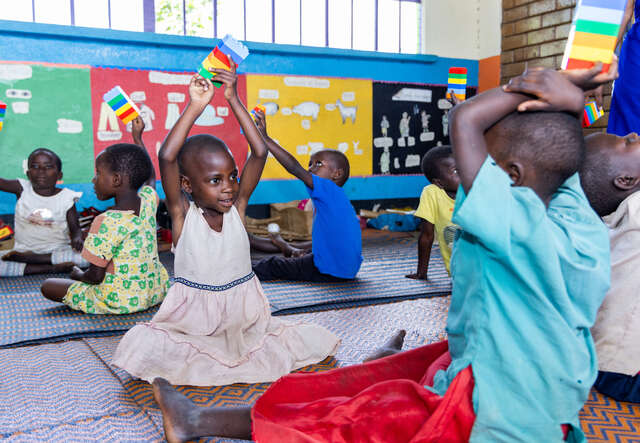
Teacher Enid’s classroom bursts with vibrant colors and is decorated with handmade posters and learning materials. In a box in the corner, colorful LEGO® bricks are stacked neatly in sixes.
Her profound passion and care for her students’ education goes back to when she was a child herself. “The person that inspired me to be a teacher is the teacher that taught me,” Enid explains. “I thought, ‘when I grow up, I have to be like my teacher, and I have to show other learners the love she shows me.’”
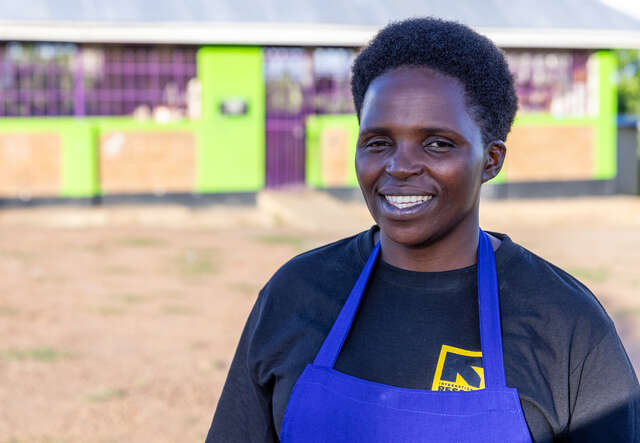
At the start of the school day, a group of enthusiastic children, aged 5 to 6 years old, eagerly enter the classroom. They neatly place their small shoes by the door and settle down on the classroom floor, patiently waiting for the class to begin. Teacher Enid leads the way with a delightful song and dance routine, which the children joyfully join in. With boundless energy, they sing along while merrily jumping around.
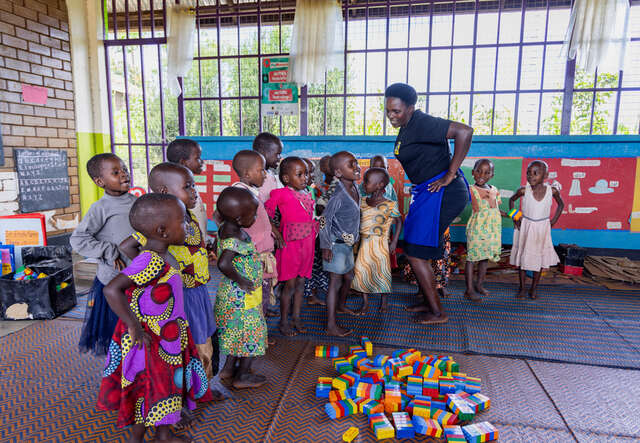
In 2023, PlayMatters introduced the innovative Six Bricks concept to schools in East Africa, aiming to enhance interactive and engaging learning in the classroom. This approach involves utilising sets of LEGO bricks, marking the first time these materials are being utilised at such a large scale in refugee and host community schools.
Incorporating Six Bricks can help kids develop many essential skills, including spelling, colours and arithmetic. “We do activities with constructing - forming the numbers and building the shapes with the LEGO bricks”, Enid explains “They jump over the bricks while they are counting, and throw and catch.”
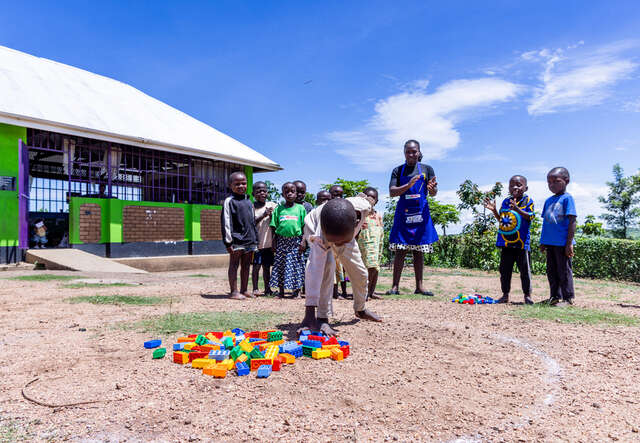
“The children now know that green belongs to the environment, that red is like a tomato, yellow is for stars, sun, and banana,” says Enid.
“The colour light blue was a challenge, it took a long time for them to understand it, but now they know each and every colour.” She says the children have also learned to recognise textures with the different edges of the bricks.
As they interact with the bricks in class and each other, they play together and develop teamwork skills. “It has taught children turn-taking,” says Enid. “ At first you heard them fighting for the bricks and saying, ‘These are mine,’ but now they know how to work together nicely.”
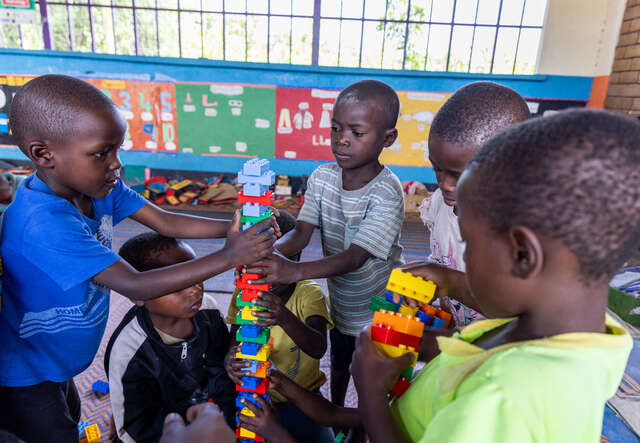
Meanwhile, Izidora teaches older children, with some of them ranging from the ages 11 to 20 in just one lesson. He has found incorporating the Six Bricks methods just as beneficial. “When I compared it with the instruction materials I had been using before, I discovered that learning through play is more joyful,” he recalls.
“And cooperation is promoted - the students are working to bring their ideas together,” Izidora elaborates. “For example, if a child is given a problem to solve and they find out the Six Bricks cannot work, the child goes to a friend and they share. Then together they work out the task they were given.”
In Izadora's classes, where students from diverse backgrounds come together to embrace a new community, he places great importance on nurturing their sharing, communication, and cooperation skills. These invaluable abilities not only aid their adjustment but also foster personal growth and enrich their overall learning experience.
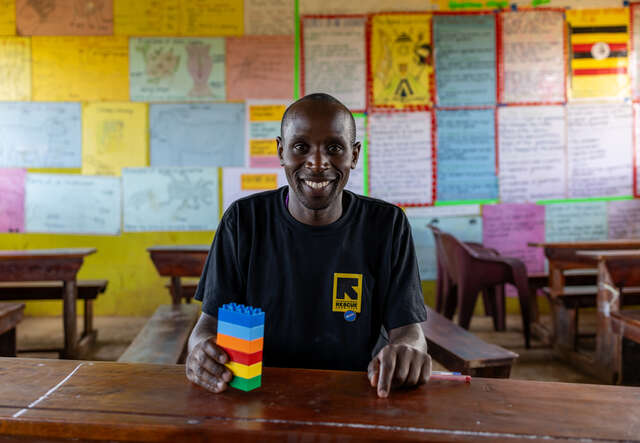
Play is a widely recognised approach to foster social and emotional development in children. In Izidora and Enid's classes, numerous students are refugees from the Democratic Republic of Congo. Facilitating these learners, who might have undergone traumatic experiences, in acquiring knowledge through playful activities holds immense significance in enhancing their mental health and overall well-being.
“The children we are teaching have gone through circumstances which are extremely difficult,” Enid explains. “Bringing in the LEGO bricks brings them fun and joy.”
Throughout her lessons, Enid encourages and praises the children and lets them know they are smart. Her pride for her learners shows in her work. “I wish for my learners to all grow and love studying,” she says. “When I'm old, I hope that they all have jobs and they are somewhere which even I have never reached.”
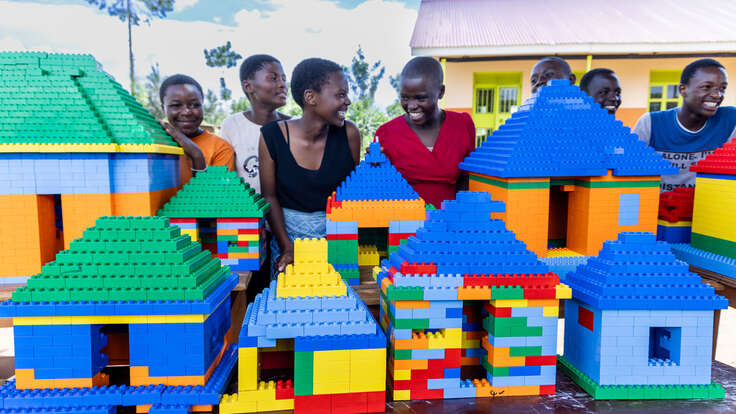
The PlayMatters programme seeks to improve the holistic development and wellbeing of 800,000 refugee and host community children in East Africa using learning through play teaching methods.
In 2023, PlayMatters introduced the Six Bricks concept. The approach was created by Care for Education (CFE) and is based on the creative application of six LEGO® Bricks to educational activities. With the support of CFE, the Six Bricks approach is currently being adapted and implemented by the PlayMatters Consortium across Ethiopia and Uganda.
This consortium is led by the IRC, in collaboration with the Behavioural Insights Team, Innovations for Poverty Action, Plan International, and War Child Holland, in partnership with the LEGO Foundation. The concept is incorporated alongside locally available teaching and learning materials.
Learn more about the PlayMatters program